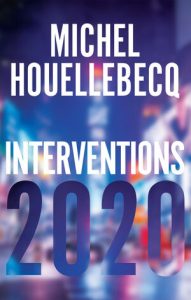
By Michel Houellebecq. Translated by Andrew Brown.
Polity Press, 2022.
Hardcover, 314 pages, $25.00.
Reviewed by Pedro Blas González.
What makes Michel Houellebecq a singular writer for today is his understanding of postmodern man’s existential boredom and inability to cope with life on its own terms. One of the chapters in Interventions 2020, a book of essays and interviews that appeared in English in 2022, is appropriately titled, “A remedy for the exhaustion of being.”
Houellebecq is the consummate chronicler of postmodernism’s collapse of Western values. If Derrida, Foucault and other chic purveyors of nihilism made a name for themselves by “deconstructing,” that is, annihilating objectivity, Houellebecq is the street sweeper who picks up the refuse after the party.
Interventions 2020 is quintessential Houellebecq, a writer in the vein of Celine, a spokesman for common sense who exposes the debilitating effect that nihilism, as a form of public policy, has on meaning and purpose in private life.
One of Houellebecq’s strengths as a writer is his recognition that meaninglessness and banality—both staples of nihilism—have always affected individuals. Individuals have always had to deal their cards when challenged by life, other people, and society. This is hardly new. The difference between nihilism as a private response to life’s contingencies and its sinister manifestation as public policy, Houellebecq aptly points out, is that the latter demands that nihilism become institutionalized. The latter is the white elephant in the room of postmodernity.
The normalization of nihilism is the backbone of deconstructionism, albeit its attendant values include hatred for Christianity, capitalism, and the nuclear family. While remaining an idiosyncratic personal attitude toward life, nihilism could never become a weapon against life itself. This merely remains a personal concern. How, then, did nihilism acquire its destructive power over entire societies? The normalization of nihilism has been achieved because free will has been turned into a burden.
In his novels Houellebecq enables his characters to explore nihilism, while readers are left to make up their mind about the outcome. Literary creation allows for the presentation of a large array of topics and themes. Readers accept this as a literary convention, regardless of whether they embrace the values of any character.
Interventions 2020 presents Houellebecq’s disgust with nihilism and leftism in a direct manner. His interviews are philosophically insightful and unapologetic. The essays in this collection explore his chosen topics in a tone worthy of Montaigne, that is, as a thinker that explores the themes of his essays as if talking aloud.
Houellebecq’s essays in Interventions 2020 fill the void created by academic philosophy by providing readers with thoughtful reflection on real-world themes that demand attention. He has much to say about Descartes, Comte, scientism, and God. Houellebecq’s philosophical reflection is not encumbered by the straitjacket and hypocrisy of radical ideology. For instance, in “Soil Cutting” the author argues that August Comte’s dream of a positive age levels any possibility of existential contemplation, leaving man with self-consuming nihilistic scientism as a religion of the here-and-now: “And what will lead them, given their awareness that, as individuals, they are transient beings, to be satisfied with their participation in this fetish of theory? Who, in the final analysis, can be interested in a religion that does not preserve them from death?”
Houellebecq conceives postmodern life as a trap, a dead-end proposition that can no longer be sustained. The author of the novels The Elementary Particles and Platform, among others, ponders the question: what should be the corrective to postmodern nihilism?
Readers of Houellebecq will notice a marked difference between Interventions 2020, a book that makes light of the author’s volatile literary trajectory fraught with attacks from critics and legal proceedings leveled at him by French leftists, and his novels. Interventions 2020 is the work of a world-weary mature author.
While reflecting on his novels with the perspective that the passage of time affords any writer, Houellebecq remains a steadfast exponent of writers and thinkers to express themselves freely in open societies. He laments the disappearance of the free press as much as the death of personal communion, if not communication between people: “The gradual crumbling of creativity in the arts is thus just another face of the very contemporary fact that conversation is now impossible.”
Two significant differences that readers of Houellebecq will find in this enjoyable book are his new-found positive attitude toward the Catholic faith and his conviction that postmodern existence is a tragic, gutted affair with meaninglessness that can no longer be sustained.
Interventions 2020 shows us the face of a conservative Michel Houellebecq. This stage of Houellebecq’s development as a writer and thinker will confuse his detractors, for they will ask, “what about the nihilistic themes he entertains in his novels, the death of God, suicide, and depression?” He answers that he is not a proponent of the fashionable trends that hedonists and nihilism promote, only a chronicler and interpreter of an age that has exhausted itself with self-destruction, and which must be re-invented if it is to survive.
Pedro Blas González is a professor of philosophy at Barry University.
Support the University Bookman
The Bookman is provided free of charge and without ads to all readers. Would you please consider supporting the work of the Bookman with a gift of $5? Contributions of any amount are needed and appreciated!